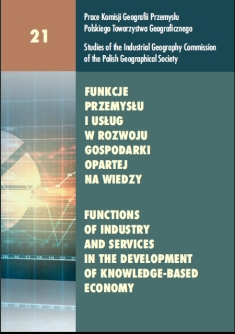The Role of Service Sector in the Creation of Knowledge-Based Economy in India
DOI:
https://doi.org/10.24917/20801653.21.20Keywords:
India, services, knowledge-based economy, offshoring, IT sectorAbstract
India is distinctive for the rapid growth of its service sector. It is a large and most dynamicpart of the Indian economy both in terms of employment potential and contribution to national income.Service sector in India accounts for more than half of India’s GDP. India is one of the fastest growingnations in global service trade, and is a major exporter of business services, particularly IT and informationservices. The country is the world leader in offshoring services. India remains the most frequentlychosen location for contracting services and is the leading country in all rankings that focus onthe delocation of services. As a result, India is witnessing a transition from agriculture-based economyto a service-based economy. The service sector plays an important role in building knowledge-basedeconomy in India. The present article examines the importance of the service sector for the creation of knowledge-based economy in India. It is divided into three parts. Part One discusses the economicsignificance of the service sector in India. Part Two considers the role of information-intensive servicesin the creation of knowledge-based economy in India and Indian position as the offshore location. Italso analyzes India’s services exports, its composition, and revealed comparative advantage of varioussectors of services. Part Three analyzes the conditions of the development of modern services industryin India.Downloads
Metrics
References
A.T. Kearney, (2009). The Shifting Geography of Offshoring. The 2009 A.T. Kearney Global Services Location IndexTM. Chicago: A.T. Kearney
A.T. Kearney, (2011). Offshoring Opportunities Amid Economic Turbulence. The A.T. Kearney Global Services Location IndexTM. Chicago: A.T. Kearney
Commander, S. et al. (2008). The Consequence of Globalisation: India’s Software Industry and Crossborder Labour Mobility. The World Economy, 31(2), 187–211
Communication from the Commission to the Council, the European Parliament and the European Economic and Social Committee – an EU-India Strategic Partnership. Brussels, 16.6.2004, COM/2004/0430 final
D’Costa, A.P. (2011). Geography, Uneven Development and Distributive Justice: The Political Economy of IT Growth in India. Cambridge Journal of Regions, Economy and Society, 4, 237–251
Das, K. (2007). GATS Negotiation and India: Evolution and State of Play. Journal of World Trade, 41(6), 1185–1236
Datt, G., Ravallion, M. (2011). Has India’s Economic Growth Become More Pro-Poor in the Wake of Economic Reforms? The World Bank Economic Review, 25(2), 157–189
Dougherty, S.M., Herd, R. (2008). Improving Human Capital Formation in India. OECD Economics Department Working Papers, 625
Farasat, S. (2008). India’s Quest for Regional Trade Agreements: Challenges Ahead. Journal of World Trade, 42(3), 433–460
Gooptu, N. (2011). Economic Liberalization, Urban Politics and the Poor. W: R. Sanjay, J. Harriss, R. Corbridge (red.), Understanding India’s New Political Economy: A Great Transformation? New York: Routledge, 35–48
Gupwell, D., Gupta, N. (2009). EU FTA Negotiation with India, ASEAN and Korea: the Question of Fair Labour Standards. Asia Europe Journal, 7, 79–95
Gurbała, M. (2010). Przemysł high-tech a poziom rozwoju społeczno-gospodarczego krajów. Prace Komisji Geografii Przemysłu Polskiego Towarzystwa Geograficznego, 16, 187–200
Kilar, W. (2009). Zróżnicowanie potencjału ekonomicznego światowych korporacji informatycznych. Prace Komisji Geografii Przemysłu Polskiego Towarzystwa Geograficznego, 13, 110–121
Kliniewicz, K. (2008). Indyjski model offshoringu. Wnioski dla Polski. W: A. Szymaniak (red.), Globalizacja usług: outsourcing, offshoring i shared services center. Warszawa: Wydawnictwa Akademickie i Profesjonalne, 255–284
Ministerial Declaration, Doha, 14 November 2001. Pozyskano z: http://www.wto.org/english/thewto_ e/minist_e/min01_e/mindecl_e.htm
Ministerstwo Gospodarki, Departament Analiz i Prognoz (2007). Chiny i Indie w procesie globalizacji
Potencjalne konsekwencje dla Polski. Warszawa: Ministerstwo Gospodarki
Munsil, S. (2011). India’s Offshoring Role. Outsourcing Yearbook 2011. Pozyskano z: http://www.eoa-spain.es/1/the_outsourcing_yearbook_2011_203894.html
Ravallion, M. (2011). A Comparative Perspective on Poverty Reduction in Brazil, China, and India. Policy Research Working Paper, 5080
Richardson, J.B. (1987). What Really Happened at Punta del Este: Understanding the Framework of the Uruguay Round. W: D. Riddle (red.), Toward an International Service and Information Economy. Bonn: Friedrich Ebert Foundation Reserve Bank of India. Pozyskano z: http://www.rbi.org.in
Szukalski, S.M. (2008). Chiny i Indie na globalnym rynku usług. Stan i perspektywy. W: K. Kłosiński (red.), Chiny-Indie: ekonomiczne skutki rozwoju. Lublin: Wydawnictwo KUL, 49–68
Szymaniak, A. (2008). Polska w rankingach atrakcyjności dla offshoringu usług. W: A. Szymaniak (red.), Globalizacja usług: outsourcing, offshoring i shared services center. Warszawa: Wydawnictwa Akademickie i Profesjonalne, 285–312
Uliszak, R., Grad, N. (2012). Innowacyjność kluczem rozwoju firmy IBM. Prace Komisji Geografii Przemysłu Polskiego Towarzystwa Geograficznego, 20, 40–53
World Bank Data. Pozyskano z: http://www.worldbank.org
WTO (2011). World Trade Report 2011, The WTO and preferential trade agreements: From coexistence to coherence. Geneva: WTO
WTO (2012). International Trade Statistics 2012. Geneva: WTO
Wróbel, A. (2009). Międzynarodowa wymiana usług. Warszawa: Wydawnictwo Naukowe Scholar
Zajączkowski, J. (2008). Indie w stosunkach międzynarodowych. Warszawa: Wydawnictwo Naukowe Scholar
Zajączkowski, J. (2010). Unia Europejska-Indie: strategiczne partnerstwo. W: J. Adamowski, K.A. Wojtaszczyk (red.), Strategie rozwoju Unii Europejskiej. Warszawa: Aspra JR, 223–252
Zioło, Z. (2012). Miejsce innowacyjności w kształtowaniu procesów rozwoju gospodarczego układów przestrzennych. Prace Komisji Geografii Przemysłu Polskiego Towarzystwa Geograficznego, 20, 9–32
Downloads
Published
How to Cite
Issue
Section
License
Articles are published under the terms of the Creative Commons License (CC BY-ND 4.0; Attribution– NoDerivs).

